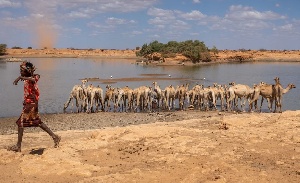Africa News of Thursday, 24 April 2025
Source: www.ghanawebbers.com
Ethiopia: 'WFP's Operations Are at Breaking Point' - Hundreds of Thousands Will Suffer
Geneva — Ethiopia is experiencing a worsening humanitarian crisis. The World Food Programme (WFP) warns of increasing hunger and malnutrition. A funding shortfall is forcing the UN to cut feeding programs.
"Hunger and malnutrition are rising," said WFP Country Director Zlatan Milisic. He spoke by phone at an April 22 press conference in Geneva. "This is due to conflict, climate shocks, economic instability, and displacement."
Milisic stated that WFP's operations are at breaking point. They have suspended treatment for 650,000 malnourished women and children this week. This suspension is due to a lack of commodities and funding.
More than 10 million people in Ethiopia are food insecure. This includes three million displaced by conflict and extreme weather conditions. Malnutrition rates are alarmingly high, with 4.4 million pregnant women and young children needing urgent treatment.
In the Somali, Oromia, Afar, and Tigray areas, child wasting is severe. "Another drought may occur soon," Milisic warned. Families in the Somali region are still recovering from the devastating drought from 2020 to 2023.
Instability in neighboring countries increases humanitarian needs in Ethiopia. WFP currently supports 800,000 refugees in Ethiopia, including 100,000 from Sudan. Tensions between Eritrea and Ethiopia raise regional concerns about potential conflicts.
The security situation in South Sudan's Upper Nile State could drive more refugees into Ethiopia. However, WFP's response remains severely underfunded.
In early 2025, WFP provided food support to over three million people. They focused on vulnerable communities but had to reduce rations significantly: 60 percent for refugees and 80 percent for displaced Ethiopians.
WFP has treated 740,000 children and pregnant or breastfeeding women for malnutrition. They also provided fresh food vouchers to 50,000 families.
By June, food assistance for 800,000 refugees will run out. WFP risks losing its ability to support new arrivals as it operates with just over half of last year's funding.











